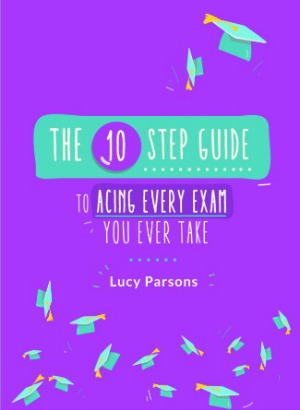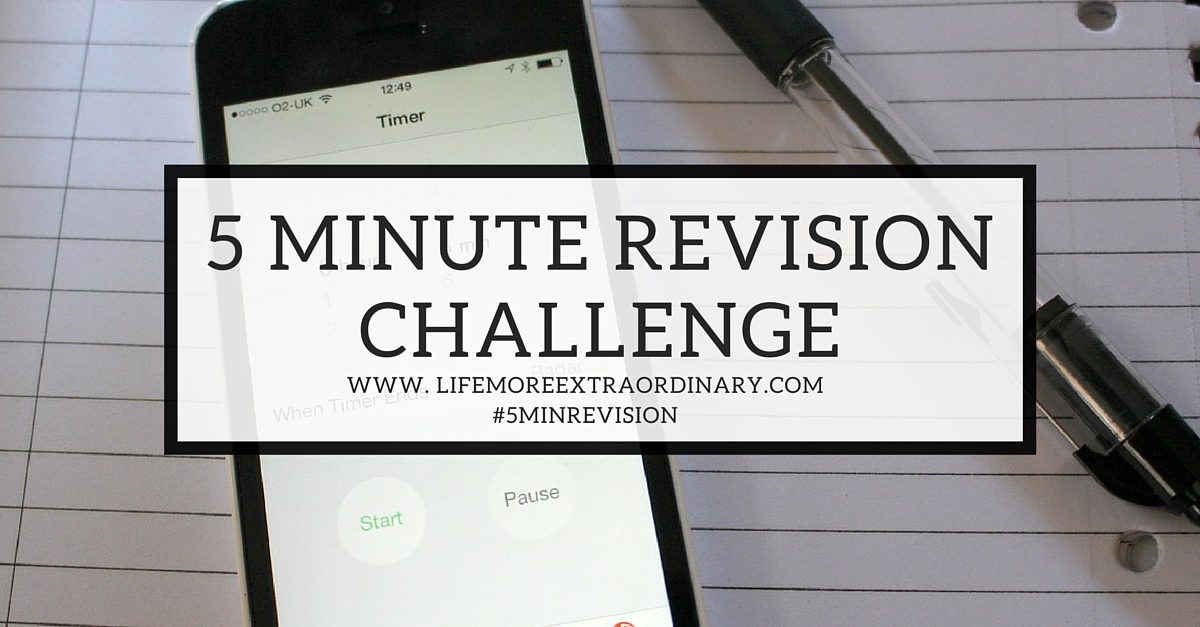The Five Minute Revision Challenge – Join today!
Imagine the effect on your grades if you revised for 5 minutes per day every day.
That would mean revising for:
- 35 minutes per week
- 150 minutes per month (2.5 hours)
- Approximately 1,050 minutes in the seven months until exams begin (17.5 hours)
The impact of adding a measly five minutes of revision to your daily life between now and your exams would be huge. There would be so much that you had committed to memory before you even started thinking seriously about revision. How much easier would that make your life in exam season? How much would it improve your grades by?
Doing five minutes of revision every day was one of the 7 tips I shared in my Start the School Year Right download. It's something I wish I'd down when I was at school. And now, I want to help you build it into your daily routine.
So, today I'm launching the Five Minute Revision Challenge.
What is the Five Minute Revision Challenge?
Everyday you will spend a minimum of five minutes revising something you've already covered in class this year.
The objectives of the challenge are to:
- Get you into the habit of revising on a daily basis
- Discover which revision techniques work best for you
- Start committing your course content to memory early so you're not cramming next May and June
What should I revise in the Five Minute Revision Challenge?
There are so many things you could do with your five minutes. Here are some suggestions:
- Memorise quotes from texts for English Literature
- Memorise dates for history
- Practice spellings of complicated technical words for the sciences and geography
- Practice drawing diagrams of scientific processes
- Memorise definitions of subject vocabulary
- Learn vocabulary or verbs for foreign languages
- Look at a historical source (picture or short text) and brainstorm what you can see
- Pick a theme from a text for English and write down as many examples of it as you can think of from the text
- Act out a story, scientific process or historical or political event
- Solve a maths problem
- Memorise a formula
- Memorise key facts for a case study
- Or, you could just read over your class notes at the end of each day to catch anything you don't fully understand so you can follow it up with your teachers.
How do you revise?
Some people are at a complete loss about how to revise. Revision basically means ‘see again': it's all about going over something again. My Pocket Oxford Dictionary says:
“Read again (work learnt or done) to improve one's knowledge.”
So, what you're doing is going over work you've already done to commit it to memory.
You can do this in all sorts of different ways. The key is to find methods that work for you.
In my book, The Ten Step Guide to Acing Every Exam You Ever Take, I list forty different ways to revise. There are six more in this blog article. No-one can use all 46 revision methods. What's important is that you experiment and play with them to come up with methods that work for you.

Download a free chapter of my book to help you work out how you should be revising…
Don't waste time on revision that doesn't work
This free chapter of my book takes you through some exercises that will help you determine which revision techniques work best for you. It will also teach you how to constantly monitor the success of your own learning so that you can always be improving your revision techniques and becoming faster and more efficient at learning. There's no point in wasting time on revision techniques that don't work! This is particularly important in the weeks leading up to your exam period. Imagine how great it would be to know how you revise best before you get to peak revision season?
Forming good habits
The idea for this revision challenge came from Sanam of Super Achiever Mentality. She was struggling to motivate herself to start revising a huge stack of papers she had collected on her desk. Then she came across an idea from Stephen Guise called ‘The One Push-up Challenge'.
Daunted by the self-imposed target of doing 30 minutes of exercise Stephen told himself he only needed to do one push-up. While he was down on the floor doing his one push-up, he thought he might as well do a few more. Setting himself a ridiculously small target made it easy for him to start and hard for him to fail. Stephen went on to write a best-selling book called ‘Mini-Habits'.
My wish for you is that you turn this five minute study challenge into a mini-habit that's easy for you to do. It's easy because it's small, but there are other ways you can make it even easier.
Find the best time for you
Choose the best time of day for you to fit this into your life. If you're a night-owl do it at night. Could you do it over breakfast, while you're on the school bus, or give up five minutes of TV watching? You might need to experiment with the best time to fit it in for you.
Make yourself accountable
Tell someone you're taking part in this challenge. That might be me (just leave a comment at the bottom of this post), your mum or a friend. Just let them know your intention to do it and report back to them everyday to let them know that you've done your five minutes. Or, tweet this:
I'm taking part in the daily 5 Minute Revision Challenge with @LucyCParsons. Come and join me! #5minrevision Share on XOr, if you're a mum, dad or teacher, tweet this:
Get your teens to take part in the daily five minute revision challenge with @LucyCParsons #5minrevision Share on XI'm going to be cheering you on my via my facebook page. Everyday for the next week I'm going to have a post asking you to leave a comment when you've done your five minutes of revision. We'll also be talking about the best times of day and revision techniques. Come and like my page to join in! You can also post pictures of your revision materials on instagram or twitter with the tag #5minrevision.
Are you in?
Investing this tiny about of time every day will undoutedly get your closer to getting the grades you want.
Leave a comment below telling me that you're joining in, like my facebook page and share this post with a friend to get them involved too!

